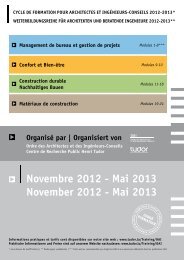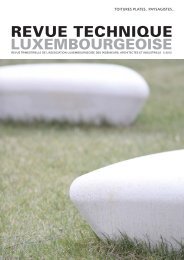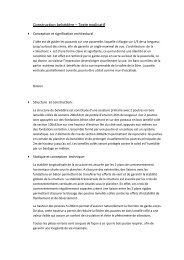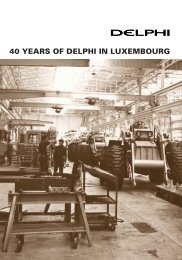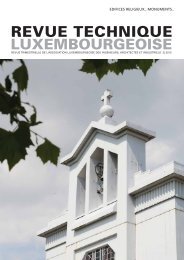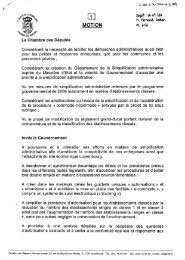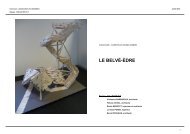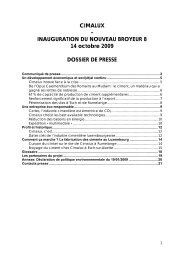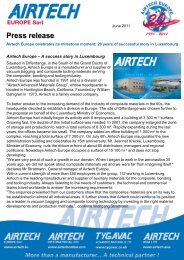Revue Technique Luxembourgeoise
Revue Technique Luxembourgeoise
Revue Technique Luxembourgeoise
You also want an ePaper? Increase the reach of your titles
YUMPU automatically turns print PDFs into web optimized ePapers that Google loves.
50 DOSSIER | REVUE TECHNIQUE LUXEMBOURGEOISE 2 | 2011<br />
_1999 An Independent Delphi<br />
On Aug. 3, 1998 General Motors Corporation and its Delphi<br />
Automotive Systems division jointly decided to make<br />
Delphi an independent group. Delphi became a publicly<br />
traded company in 1999. But the path to independence<br />
from General Motors really began in 1994 with the establishment<br />
of Delphi as a separate business sector within<br />
General Motors.<br />
_Jan. 29, 2007 - Delphi Powertrain Headquarters Grand<br />
Opening<br />
In May 2006, Delphi announced its decision to relocate<br />
the global headquarters of its Powertrain division to Luxembourg.<br />
Delphi Corporation officially opened the global<br />
headquarters of its Powertrain division in Luxembourg on<br />
Jan. 29, 2007. “We are dispersing our leadership globally to<br />
manage our business”, Delphi’s Executive Chairman said at<br />
the time. “We are committed to Europe and to supporting<br />
our local customers and we expect to continue our track<br />
record of growth in the region.”<br />
Minister Jeannot Krecké, minister of Economy and Foreign<br />
Trade of Luxembourg, welcomed the Delphi division’s<br />
global headquarters to the country. “Delphi is in fact casting<br />
a vote of confidence for Luxembourg as a performing<br />
business location for research-driven, cutting-edge technological<br />
solutions for one of the most demanding markets,<br />
namely the automotive sector,” he said.<br />
Delphi’s CTC Luxembourg is now part of Delphi Automotive LLP,<br />
which was created in October 2009 when a group of private<br />
investors acquired assets of the former Delphi Corporation.<br />
The site concentrates specifically on design, development<br />
and test of components, sub-systems and systems related<br />
to Energy and Engine Management Systems as well as<br />
Heating, Ventilating and Air Conditioning Systems and the<br />
development of the required power and control electronics,<br />
as well as the energy storage for hybrid and electric<br />
vehicles. From Bascharage, all European customers can be<br />
served and work for vehicle manufacturers also can be undertaken<br />
on a global basis. The geographical location of<br />
Luxembourg in the centre of Europe also is an important<br />
benefit. The Luxembourg workforce has a total of 27 different<br />
nationalities and 18 languages can be spoken.<br />
The site is Delphi’s Middle-East and Africa regional headquarters,<br />
Powertrain Systems Divisional Headquarters as well as<br />
headquarters for the European Thermal Business Unit.<br />
_The Facilities of Delphi Luxembourg<br />
The Luxembourg site is fully equipped to design, develop,<br />
simulate, test and validate products from the component<br />
level up to the vehicle level. Hundreds of specific component<br />
test stands for thermal cycling, noise, vibration and<br />
performance characterization are available for component<br />
development. Two model shops and the large garage are<br />
equipped with tooling and assembly machinery to build<br />
components and install them in vehicles. At the system<br />
level, the site is equipped with module test stands and engine<br />
dynamometers able to simulate the entire lifecycle of<br />
the system. Finally, large vehicle evaluation equipment is<br />
available to perform real-life testing of vehicles under all<br />
conditions, such as noise, electromagnetic compatibility,<br />
emissions, comfort and drivability evaluation. This includes<br />
cold chambers and an external test track with pass-by noise<br />
measurement facility. The operation is supported by a material<br />
laboratory and a large electronics facility able to develop<br />
complete electronic hardware and software for production<br />
vehicle application.<br />
Testing and verification in the Electromagnetic Compatibility<br />
Chamber (EMC) ensures excellent operation of Delphi<br />
systems and components in the presence of strong electromagnetic<br />
disturbances. Emissions testing range is possible<br />
from 20Hz – 1800 MHz. Immunity testing can be done in a<br />
range from 10kHz –1000 MHz.<br />
In March 2010, Delphi Luxembourg received a government<br />
award for Stress Prevention. Delphi was among five national<br />
companies in Luxembourg to receive the 2009 Prix Santé en<br />
Entreprise (Company Health Prize), which was presented by<br />
the Luxembourg Minister of Health, Mars Di Bartolomeo.<br />
The subject covered employee well-being with regards to<br />
health promotion and prevention of physical and psychological<br />
problems, extending as well to best-practices to live<br />
a healthier life outside the workplace.<br />
In February 2011, Delphi was awarded for excellence in<br />
technology management. Delphi Automotive received the<br />
2010 “Successful Practice Award” for targeted and efficient<br />
technology management from the prestigious Fraunhofer<br />
Institute for Production Technology.<br />
DELPHI LUXEMBOURG TODAY<br />
_The Activities of Delphi Luxembourg<br />
Delphi’s Luxembourg Customer Technology Centre has<br />
become one of the company’s most important European<br />
operations, providing crucial support for the development<br />
of energy and engine management systems, as well as thermal<br />
systems, electronic control modules and power electronics<br />
products.<br />
In the Vehicle Semi Anechoic Chamber, systems are tested<br />
for noise and vibration performance within the car. Testing<br />
and verification in this chamber ensures Delphi systems<br />
to match with customer’s noise and vibration requirement<br />
under all conditions.<br />
A total of 13 engine dynamometers are running prototype<br />
engines in all operating conditions while recording<br />
temperatures, emissions and performance data real-time.<br />
These dynamometers also are used for calibration purposes,<br />
which is where the control software and parameters for the<br />
engine operation are defined and downloaded to the engine<br />
control unit.




